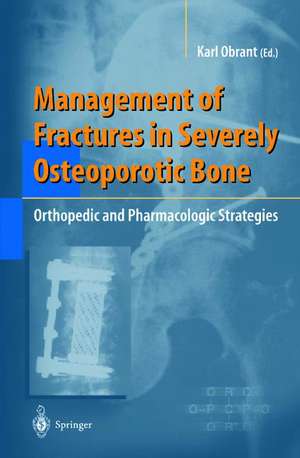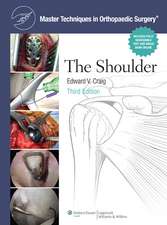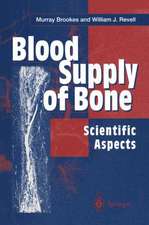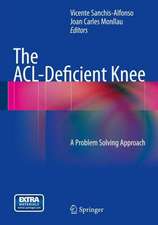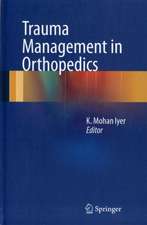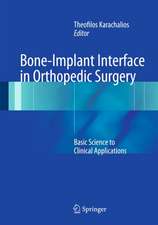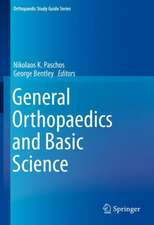Management of Fractures in Severely Osteoporotic Bone: Orthopedic and Pharmacologic Strategies
Editat de Karl Obranten Limba Engleză Hardback – 11 mai 2000
| Toate formatele și edițiile | Preț | Express |
|---|---|---|
| Paperback (1) | 1427.42 lei 6-8 săpt. | |
| SPRINGER LONDON – 12 oct 2010 | 1427.42 lei 6-8 săpt. | |
| Hardback (1) | 1444.80 lei 6-8 săpt. | |
| SPRINGER LONDON – 11 mai 2000 | 1444.80 lei 6-8 săpt. |
Preț: 1444.80 lei
Preț vechi: 1520.84 lei
-5% Nou
Puncte Express: 2167
Preț estimativ în valută:
276.47€ • 295.63$ • 230.51£
276.47€ • 295.63$ • 230.51£
Carte tipărită la comandă
Livrare economică 17 aprilie-01 mai
Preluare comenzi: 021 569.72.76
Specificații
ISBN-13: 9781852332204
ISBN-10: 1852332204
Pagini: 624
Ilustrații: XVI, 604 p.
Dimensiuni: 156 x 234 x 42 mm
Greutate: 1.29 kg
Ediția:2000
Editura: SPRINGER LONDON
Colecția Springer
Locul publicării:London, United Kingdom
ISBN-10: 1852332204
Pagini: 624
Ilustrații: XVI, 604 p.
Dimensiuni: 156 x 234 x 42 mm
Greutate: 1.29 kg
Ediția:2000
Editura: SPRINGER LONDON
Colecția Springer
Locul publicării:London, United Kingdom
Public țintă
Professional/practitionerDescriere
Over the past decade, major advances have taken place in the management of osteoporosis. Newdasses of pharmaceutical agents have been developed, tested, and used to treat millions of patients; education and early detection programs have been instituted around the world; and bone densitometry has received widespread recognition by healthcare agencies as being central to the preven tive health strategy necessary to care for an aging population. With all these advances, scientists continue to explore new methods to understand and treat this disease. The field of orthopaedic surgery has a great opportunity to bring this new information to its dinics and operating rooms. It is critically impor tant that the practicing surgeon be armed with this knowledge. Fractures are dearly the most common orthopaedic problem associated with osteoporosis. The goals of treatment are rapid restoration of mobilityand func tion and return of patients to a level of activity that supports their general health. The ability to control the metabolic condition or to treat the under lying cause of the osteoporosis with pharmacological intervention willimprove surgical results. Moreover, the special techniques required to succeed in the operative treatment of bone, which is already weakened by osteoporosis, must be carefully developed, tested, and understood. This book provides the first attempt to bring this body of information to the orthopaedic surgeon in a dearly organized and comprehensive way. Historically, few orthopaedic surgery or trauma training programs have offered much in the way of education in the science of bone metabolism.
Cuprins
I. General Aspects on Osteoporosis and Fracture:Size of the Problem. Pathophysiology. X-Ray Absorptiometry. Ultrasound. Bone Quality. Biochemical Markers. Fracture Risk.-II. Fracture Healing:Deficient Fracture. Growth Factors. Bone Graft Substitutes. Fracture Healing.III. Orthopedic Management Options:Hip Fracture. Wrist Fracture. Spinal Fractures. Other fractures in Osteoporotic Patients.-IV. Non-Pharmacological Prevention of Osteoporotic Fractures:Prevention of Falls. Hip Protectors. Nutrition. Physical Activity.-V. Pharmacological Prevention of Osteoporotic Fractures:Calcium and Vitamin D. Estrogen. Bisphosphonates. Calcitonin. Flouride. Androgens and Anabolic Steroids. Estrogen Receptor Modulators (SERMs). Evolving Therapies.-VI. Identification and Management of Secondary or Localized Bone Loss:Rheumatoid Disease. Transient Migratory Osteoporosis. Immobilization and Posttraumatic Osteopenia. Sympathetic Dystrophy. Localized Osteolysis After Joint Replacement Surgery.-VII. Concluding Remarks:Fractures Prevention Algorithm.
Caracteristici
Includes discussion of both basic sciences of detection and diagnosis, in addition to medical and surgical management techniques (most books on the subject focus on one or the other)
Provides a profound insight into different orthopedic treatment options in fractures of osteoporotic bone, and complements this with a broad discussion of both pharmacological and non-pharmacological management of osteoporosis
Provides a profound insight into different orthopedic treatment options in fractures of osteoporotic bone, and complements this with a broad discussion of both pharmacological and non-pharmacological management of osteoporosis
